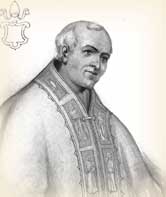 Good guy or bad guy? On this day, March 27,
1329, Pope John XXII condemned seventeen statements made by
Meister (Master) Eckhart and said that eleven others were rash. Eckhart
had appealed to the pope following his condemnation by a church court.
He died before he got the pope's ruling.
Good guy or bad guy? On this day, March 27,
1329, Pope John XXII condemned seventeen statements made by
Meister (Master) Eckhart and said that eleven others were rash. Eckhart
had appealed to the pope following his condemnation by a church court.
He died before he got the pope's ruling.This ruling did not stop Eckhart's disciples from spreading his teachings. His works had a strong influence on German mystics who came after him: John Nider, John Tauler and Nicholas Cusa among them. Indeed, he was one of the strongest influences on German Christianity before Luther and the Reformation. To this day, his defenders excuse him by saying that he was not really a heretic: he just expressed himself in dramatic language that could be easily misunderstood.
Much of what Eckhart taught was excellent. For example, he said that external acts such as pilgrimages and fasts were worthless unless the soul had the right attitude. He reminded people that God delights in goodness:
"And in every deed, however puny, that results in justice,He showed his readers the danger of sin:"
God is made glad, glad through and through.
At such a time there is nothing in the core of Godhead
that is not tickled through and through
and that does not dance for joy."
Now God is the life of the soul, and deadly sin separates from God; therefore it is a death of the soul. Deadly sin is also a disquiet of the heart, for everything rests nowhere except in its own proper place; and the proper resting-place of the soul is nowhere except in God... Deadly sin is also a weakening of the powers, for by his own power no one can throw off the load of sin nor restrain himself from committing sin. It is also a blindness of the sense, for it prevents a man recognizing how brief is the space of time that can be spent in the pleasure of voluptuousness, and how long are the pains of hell and the joys of heaven. Deadly sin is also a death of all grace, for whenever such a sin is committed, the soul is bereft [deprived] of all grace. Similarly, it is the death of all virtue and good works, and an aberration of the spirit."However, the pope was right to condemn certain of Eckhart's statements. Although Meister Eckhart studied Scripture for a deeper understanding of God--an understanding that he hoped would bring life to the soul--he speculated so freely that at times he actually opposed scripture. For example, whereas the Bible teaches that love is the greatest thing, Eckhart taught that solitude is, because in solitude one can "force" God down into one's own soul.
Meister Eckhart's thinking fits well with certain New Age ideas, for he described every creature as both a revelation of God and a part of him, blurring the lines between God and his creatures.
However, he never rejected man's need for the church or the sacraments. In fact, when accused by the Archbishop of Cologne, he readily said that he would recant any teaching that was in error.
Consequently, the pope said that he died reconciled to the church.
Bibliography:
- Eckhart, Meister Johannes. "The Self-Communication of God." Meister Eckhart's Sermons, translated by Claud Field. http://www.ccel.org/ccel/eckhart/sermons.all.html#viii.
- McMahon, A. L. "Meister Johann Eckhart." The Catholic Encyclopedia. New York: Robert Appleton, 1909.
- Pell, Archbishop George. Issues of Faith and Morals. Oxford University Press, 1996; cited at http://www.edmundrice.org/multimedia/ stage%204%20-%20Text%20-%20Poem.pdf.
- Runes, Dagobert. Treasury of Philosophy. Philosophical Library, 1955.
- Schmidt, C. "Eckhart," A Religious Encyclopedia or Dictionary of Biblical, Historical, Doctrinal, and Practical Theology, edited by Philip Schaff. New York & London: Funk & Wagnalls Company, 1894.
- Various other encyclopedia and internet articles